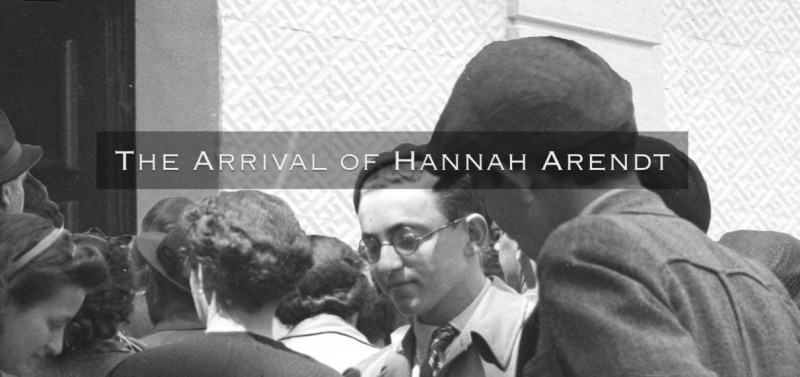
The Arrival of Hannah Arendt
This film describes the arrival of Hannah Arendt - a Jewish, German-American political theorist and publicist - in New York and her reflections on flight and helping people start over.
Paris, 4. März 1939
Lieber Prinz Löwenstein,
Ich habe von Ihnen und von der Akademie Monate lang nichts mehr gehört. Das verwundert mich um so mehr als Sie mir damals bald “schricht geben wollten und eine günstige Regelung in Aussicht stellten.
Ich schrieb Ihnen bereits, dass ich unter schwierigen Bedingungen arbeite. Diese Bedingungen haben sich inzwischen aus Gründen, die mit den äusseren Verhältnissen zusammenhängen, noch ganz wesentlich verschlechtert.
Da ich weiss, dass sich die Akademie zur Hauptaufgabe gestellt hat, den Schriftstellern bei Ihrer Arbeit zu helfen, und dass Sie selbst wie Sie mir versicherten, sich für mich einsetzen wollen, bitte ich sie nochmals alles Nötige zu unternehmen, damit ich die Mittel zur Durchführung meiner jetzigen Arbeit bald bekommen kann.
Es grüsst Sie herzlich
Ihre
Anna Seghers
Für Briefe
Adr. Boite 1646
22 Rue ST. Augustin.
Paris 2
Für Sendungen:
Querido Verlag
Amsterdam
Keizersgracht 333
Dear Prince Löwenstein,
I have not heard from you and from the Academy for months. This surprises me all the more as you wanted to give me notice soon and held out the prospect of a favorable arrangement.
I already wrote to you that I was working under difficult conditions. In the meantime, these conditions have worsened considerably for reasons connected with the external circumstances.
Since I know that the Academy has set itself the main task of helping writers with their work, and that you yourself, as you assured me, want to do everything for me, I ask you once again to do everything necessary so that I can soon obtain the means to carry out my present work.
Sincerely yours
Yours
Anna Seghers
For letters
Addr. Boite 1646
22 Rue ST. Augustin.
Paris 2
For shipments:
Querido Publishers
Amsterdam
Keizersgracht 333
Anna Seghers (1900-1983), born Netty Reiling in Mainz, was a German writer of Jewish origin. She studied art history, sinology, history and philology in Heidelberg and Cologne. In 1925 she married László Radványi, a Hungarian social scientist. The couple had two children shortly after, Peter born in 1926 and Ruth born in 1928. Between the births of her children, she published the story Grubetsch in 1937, for which she received the prestigious Kleist Prize.
Due to Nazi persecution, Seghers fled to France in 1933, where she remained until 1941, after which she fled to Mexico. Seghers had been a member of the German Communist Party since 1929, as well as the League of Proletarian Revolutionary Writers. This, along with her Jewish background, made her a victim of Nazi persecution. While living in exile in France, she wrote Der Kopflohn, Der Weg durch den Februar, and Die Rettung. The letters that are in this correspondence were all written from her address in Paris. In exile she also wrote The Seventh Cross, which she published in 1942, making her famous worldwide. After the war, she published The Trip of the Dead Girls, which deals with the murder of her mother in the Piaski concentration camp.
In her letters to Hubertus Prinz zu Löwenstein, the founder of the American Guild for German Cultural Freedom, Anna Seghers advocates for herself and others to receive help for their 4artistic work. The American Guild for German Cultural Freedom was an organization that helped German artists, writers, and intellectuals in exile whose opportunities to work were impaired by the fascist government in Germany. The goal of the organization was to keep German culture alive outside of Germany, as it could not survive and thrive within German borders. The American Guild for German Cultural Freedom helped these people by providing financial support. The refugee experience of the German exiles was different for each individual. One of the main difficulties in fleeing is adjusting to a completely new place and finding a support system. The American Guild for German Cultural Freedom tried to help the German exiles with this adjustment so that they could also focus on their work at the same time.
Letter from Anna Seghers to Prince Löwenstein, September 1938 © Deutsches Exilarchiv 1933–1945 der Deutschen Nationalbibliothek – German Exile Archive 1933-1945 from the German National Library .